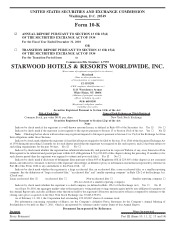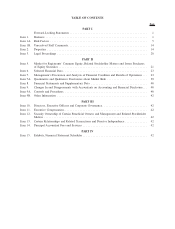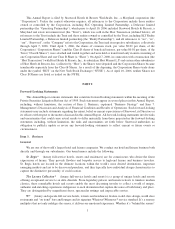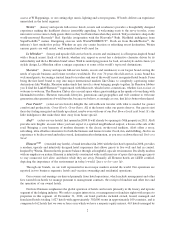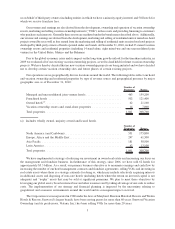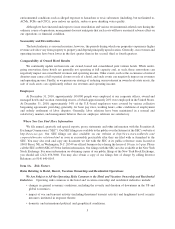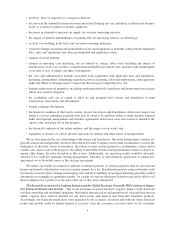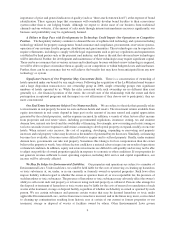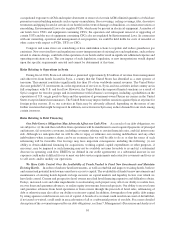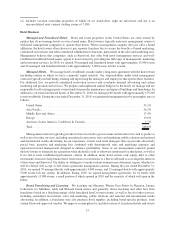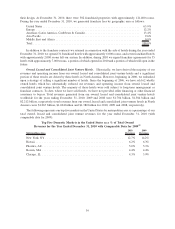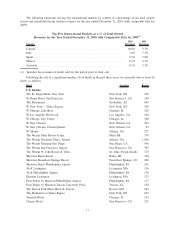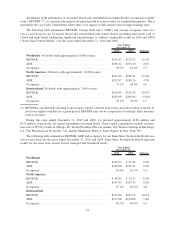Starwood 2010 Annual Report Download - page 77
Download and view the complete annual report
Please find page 77 of the 2010 Starwood annual report below. You can navigate through the pages in the report by either clicking on the pages listed below, or by using the keyword search tool below to find specific information within the annual report.importance of price and general indicators of quality (such as “three-star downtown hotel”) at the expense of brand
identification. These agencies hope that consumers will eventually develop brand loyalties to their reservations
system rather than to our lodging brands. Although we expect to derive most of our business from traditional
channels and our websites, if the amount of sales made through internet intermediaries increases significantly, our
business and profitability may be significantly harmed.
A Failure to Keep Pace with Developments in Technology Could Impair Our Operations or Competitive
Position. The hospitality industry continues to demand the use of sophisticated technology and systems including
technology utilized for property management, brand assurance and compliance, procurement, reservation systems,
operation of our customer loyalty program, distribution and guest amenities. These technologies can be expected to
require refinements, including to comply with the legal requirements such as privacy regulations and requirements
established by third parties such as the payment card industry, and there is the risk that advanced new technologies
will be introduced. Further, the development and maintenance of these technologies may require significant capital.
There can be no assurance that as various systems and technologies become outdated or new technology is required,
we will be able to replace or introduce them as quickly as our competition or within budgeted costs and timeframes.
Further, there can be no assurance that we will achieve the benefits that may have been anticipated from any new
technology or system.
Significant Owners of Our Properties May Concentrate Risks. There is a concentration of ownership of
hotels operated under our brands by any single owner. Following the acquisition of the Le Méridien brand business
and a large disposition transaction to one ownership group in 2006, single ownership groups own significant
numbers of hotels operated by us. While the risks associated with such ownership are no different than exist
generally (i.e., the financial position of the owner, the overall state of the relationship with the owner and their
participation in optional programs and the impact on cost efficiencies if they choose not to participate), they are
more concentrated.
Our Real Estate Investments Subject Us to Numerous Risks. We are subject to the risks that generally relate
to investments in real property because we own and lease hotels and resorts. The investment returns available from
equity investments in real estate depend in large part on the amount of income earned and capital appreciation
generated by the related properties, and the expenses incurred. In addition, a variety of other factors affect income
from properties and real estate values, including governmental regulations, insurance, zoning, tax and eminent
domain laws, interest rate levels and the availability of financing. For example, new or existing real estate zoning or
tax laws can make it more expensive and/or time-consuming to develop real property or expand, modify or renovate
hotels. When interest rates increase, the cost of acquiring, developing, expanding or renovating real property
increases and real property values may decrease as the number of potential buyers decreases. Similarly, as financing
becomes less available, it becomes more difficult both to acquire and to sell real property. Finally, under eminent
domain laws, governments can take real property. Sometimes this taking is for less compensation than the owner
believes the property is worth. Any of these factors could have a material adverse impact on our results of operations
or financial condition. In addition, equity real estate investments are difficult to sell quickly and we may not be able
to adjust our portfolio of owned properties quickly in response to economic or other conditions. If our properties do
not generate revenue sufficient to meet operating expenses, including debt service and capital expenditures, our
income will be adversely affected.
We May Be Subject to Environmental Liabilities. Our properties and operations are subject to a number of
Environmental Laws. Under such laws, we could be held liable for the costs of removing or cleaning up hazardous
or toxic substances at, on, under, or in our currently or formerly owned or operated properties. Such laws often
impose liability without regard to whether the owner or operator knew of, or was responsible for, the presence of
such hazardous or toxic substances. The presence of hazardous or toxic substances may adversely affect the owner’s
ability to sell or rent such real property or to borrow using such real property as collateral. Persons who arrange for
the disposal or treatment of hazardous or toxic wastes may be liable for the costs of removal or remediation of such
wastes at the treatment, storage or disposal facility, regardless of whether such facility is owned or operated by such
person. We use certain substances and generate certain wastes that may be deemed hazardous or toxic under
applicable Environmental Laws, and we from time to time have incurred, and in the future may incur, costs related
to cleaning up contamination resulting from historic uses at certain of our current or former properties or our
treatment, storage or disposal of wastes at facilities owned by others. Other Environmental Laws govern
9


